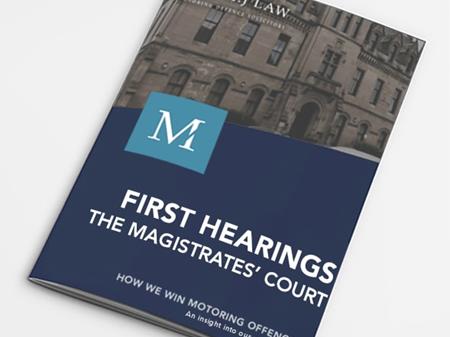Drink Driving Sentencing Guidelines
The Magistrates’ Court Sentencing Guidelines
If you are convicted of a criminal offence in England or Wales, your sentence will depend on a number of factors, including the type, seriousness and circumstances of the crime. It is crucial that your defence solicitor knows the Magistrates’ Court Sentencing Guidelines ‘inside-out’ in order to safeguard your position and ensure that the magistrates impose the most lenient penalty.
Will you go to Prison?
Our Senior Solicitor, Marcus Johnstone, discusses the risk of prison in drink and drug driving cases.
Fact: The disqualification is not affected by the timing of a guilty plea. This means that the disqualification will not increase even if you are convicted at a later date.
Please be aware that nearly all drink driving offences start in the same way - with a charge and a date for court. This does not make you guilty of the offence. If you have mistakenly assumed that your only option is to plead guilty and accept the mandatory driving ban that applies, please get in touch so that our drink driving solicitors can guide you through your options completely free of charge.
When passing sentence, the judge or magistrate will consider;
- The seriousness of the crime
- If you have any relevant previous convictions
- Any aggravating or mitigating circumstances
Guidelines
The magistrates will take into account guidelines issued to them when deciding what penalty to impose. These help to achieve consistency when sentencing.
Remember: You can use our penalty calculator for a quick indication of penalty. Or call our team on 0151 422 8020
You can find a copy of the Magistrates’ Court Sentencing Guidelines towards the bottom of this booklet. This is the starting point when considering what penalty will be imposed. There are two crucial parts to the Magistrates’ Court Sentencing Guidelines that need to be considered. Both parts will be imposed if convicted. These are;
- The punitive element The punitive element of the offence is the fine, community order or custodial sentence. These penalties are affected by the timing of a guilty plea, meaning that you would receive a greater discount if you entered a guilty plea at the earliest opportunity (usually on the first court date before seeing the evidence). This credit is gradually reduced as the case progresses.
- The ancillary order This relates to the disqualification. You may be pleased to hear that an ancillary order is not affected by the timing of a guilty plea. This means that the disqualification will not increase even if convicted at a later date.
Consider the section below from the Magistrates’ Court Sentencing Guidelines.
The Council guidelines Reduction in Sentence for a Guilty Plea, revised 2007, states that the punitive elements of the sentence should be reduced to recognise an offender’s guilty plea. The reduction has no impact on the sentencing guidelines in relation to ancillary orders, including disqualification.
The level of the reduction should reflect the stage at which the offender indicated a willingness to admit guilty and will be gauged on a sliding scale, ranging from a recommended one third (where the guilty plea was entered at the first reasonable opportunity), reducing to a recommended one quarter (where a trial date has been set) and to a recommended one tench (for a guilty plea at the ‘door of the court’ or after the trial has begun). There is a presumption that the recommended reduction will be given unless there are good reasons for a lower amount.
M.A.J. Law have defended countless drink driving cases over the years. Our solicitors believe that there is no real benefit in pleading guilty at the first court hearing. Consider for yourself what you have to gain or lose. If you plead guilty at the first hearing you will receive a immediate lengthy disqualification. This is likely to remain the same whenever you decide to plead guilty (if at all). The Sentencing Council, above, state that any reduction for a guilty plea does not apply to a disqualification.
As to the level of fine, this is based on income. The fine rarely exceeds £600.00. Even if your plea of guilty was entered at such a late date that you only received a 10% discount, this would save you around £150.00. Not much of a benefit if you are then banned for a substantial period.
Our team believe that anyone facing a long ban (or worse) should never plead guilty before attending court for a trial. By attending court for a trial you force the CPS to prepare its case for court and arrange witnesses to attend court to give evidence (including the officer conducting the breath test). Time and time again the CPS will fail to attend court with key prosecution witnesses. No witness means no evidence.
Aggravating or mitigating circumstances
Please note that in a drink driving and fail to provide allegation, the disqualification is mandatory. There is no option of paying a larger fine to reduce the disqualification.
Your sentence may also be affected by the existence of any ‘aggravating’ or ‘mitigating’ circumstances. An aggravating circumstance is something that makes a crime more serious. For example, in a drink driving case, an aggravating factor might include;
- a collision
- not having an insurance policy in place at the time
- having a child in the vehicle
- driving without a licence
- evidence of poor driving
- a police chase
A mitigating circumstance is something that makes a crime less serious. A mitigating factor might include;
- A clean driver’s licence
- Evidence of self-rehabilitation (e.g. attendance at AA meetings)
- No previous convictions
- Remorse for the offence committed
Prison and Community Service
Prison is always a last resort. Having said that, a solicitor can never guarantee that the court will not impose a custodial sentence. If you think that your case surpasses the custody threshold, the only way to guarantee that you will not go to prison is to avoid a conviction.
A community order may be more likely. Below are a list of the most common community orders;
- Unpaid work requirement
- Activity requirement
- Curfew requirement
- Residence requirement
- Mental health treatment requirement
- Drug rehabilitation requirement
- Alcohol treatment requirement
- Supervision requirement
Please note that the court will impose a disqualification alongside your community order. This means that you will have to rely on friends, family or public transport to travel to the specific locations. If you fail to attend an appointment, or turn up late, it is likely you will be brought back in front of the magistrates who will then impose a more severe penalty (such as prison, for example).
The Drink Drive Rehabilitation Course
If convicted (even after a trial), you are likely to be offered the opportunity to attend the Drink Driving Rehabilitation Course. This will reduce the period of disqualification by 25% (one quarter). Make sure you book and attend the course by the date specified by the court. The course is voluntary and can cost in the region of £350.00.
Below are the sentencing guidelines for the most common driving offences:
Drink Driving Sentencing Guidelines
| Breath | Blood | Urine | Starting point | Disqualification |
| 36 - 59 | 81 - 137 | 108 - 183 | Band C Fine | 12 - 16 month |
| 60 - 89 | 138 - 206 | 184 - 274 | Band C Fine | 17 - 22 month |
| 90 - 119 | 207 - 275 | 275 - 366 | Community Service | 23 - 28 month |
| 120 - 150 > | 276 - 345 | 367 - 459 | Prison | 29 - 36 month |
If you have a previous drink or drug driving or failing to provide within the past 10 years the minimum disqualification is 3 years. The Drink Driving Rehabilitation Course will reduce the length of ban by 25%.
Failing to Provide Sentencing Guidelines
| Activity | Starting point | Disqualification |
| Honestly held but unreasonable excuse | Band C Fine | 12 - 16 month |
| Deliberate refusal | Community Service | 17 - 28 month |
| Deliberate refusal & serious impairment | Prison | 29 - 36 month |
If you have a previous drink or drug driving within the past 10 years the minimum disqualification is 3 years. The Drink Driving Rehabilitation Course will reduce the length of ban by 25%.





